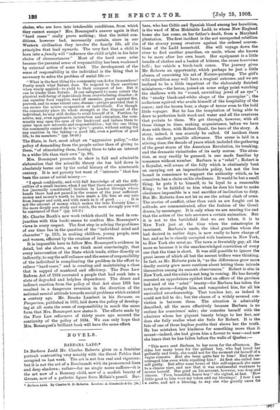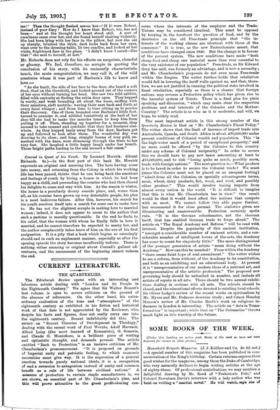NOVELS.
BARBARA LADD.•
IN Barbara Ladd, Mr. Charles Roberts gives us a feminine portrait contrasting very notably with the Sarah Tuldon that occupied us last week. The art is not less real and vigorous ; but it is not the art of a Rembrandt with its pronounced lines
• and. deep shadows ; rather—for no single name suffices—it is the art now of a Romney child, now of a modish beauty of Greuze, now of a pathetic figure from Millais's pencil. Bar-
• Barbara Ladd. By Charles G. D. Roberts. Loudon: A. Constable & Co. Ds.]
bare, who has Celtic and Spanish blood among her heredities, is the ward of Miss Mehitable Ladd, to whose New England home she has come, on her father's death, from a Maryland plantation. The first incident is the not unexpected rebellion of the stormy young creature against the ordered conven- tions of the Ladd household. She will voyage down the river to find another guardian, an uncle, whom she knows to be more after her own heart. Her equipment is a little
bundle of clothes and a basket of kittens, the causa tenerrima belll ; her vehicle a birch-bark canoe. The journey gives
Mr. Roberts an opportunity, which perhaps he just a little abuses, of exercising his art of Nature-painting. The girl's wild expedition may well have a tragical outcome, and we are inclined to be a little impatient of the elaborately finished miniatures,—the heron, poised on some sedgy point watching the shallows with its "round, unwinking jewel of an eye " ; the " stocky black-and-white shape of the porcupine "; the audacious squirrel who avails himself of the hospitality of the canoe; and the brown bear, a shape of terror even to the bold little voyager. But he has the temptation of being able to draw to perfection both wood and water and all the creatures that pertain to them. We get through, however, with all these things in time, making acquaintance, before we have done with them, with Robert Gault, the hero of the story. A story, indeed, it can scarcely be called. Of incident there is the smallest possible allowance. The scene is laid in a stirring time, the decade of years which included the gathering of the great storm of the American Revolution, its breaking, and the dramatic vicissitudes of its early course. The situa- tion, as may readily be guessed, is one made familiar by romances without number. Barbara is a "rebel " ; Robert is a Royalist, well aware of the folly which is obstinately bent on carrying out an impracticable policy, but not the less bound in conscience to support the authority which, as he conceives, has a claim on his obedience. It would be but a small thing, he puts it to himself, to be loyal to a reasonable King ; to be faithful to him when he does his best to make obedience impossible is a real sacrifice of inclination to duty. But Mr. Roberts does not let us see the actual clash of arms. The stories of conflict, other than such as are fought out in solitude, are communicated, after the fashion of the Greek drama, by messenger. It is only when we are nearing the end that the action of the tale assumes a certain animation. But it is not to the battlefield that we are taken, it is to New York just at the time when the catastrophe is imminent. Barbara's uncle, the ideal guardian whom she had desired in earlier days, is now really to have charge of her, and as he is closely occupied with business in New York, to New York she must go. The town is feverishly gay, all the more so because it is the unacknowledged conviction of every one that the time is short. It was still possible to ignore the great issues of which all but the merest triflers were thinking. In fact, as Mr. Roberts puts it, "as the differences grew more deadly society grew more cautious about letting them intrude themselves among its smooth observances." Robert is also in New York, and the crisis is not long in coming. He has fiercely resented an opprobrious epithet that an officer of the garrison had used of the " rebel " beauty—for Barbara has taken the town by storm—fought him, and vanquished him, for all his unrivalled swordsmanship. That touches her, as indeed it could not fail to do; but the chasm of a widely severed con- viction is between them. The situation is admirably described, all the more effectively because Barbara is no recluse for conscience' sake; she consoles herself with the admirers whom her piquant beauty brings to her feet, nor does she fully realise what she feels for Robert. It is the fate of one of these hapless youths that shows her the truth. He has mistaken her kindness for something more than it meant—indeed, she had given him a favour to wear—and now she hears that he has fallen before the walls of Quebeo :—
"This news sent Barbara to her room for the afternoon. Be- sides her many tears for the gallant boy, who had loved her gallantly and truly, she could not for the moment rid herself of a vague remorse. Had she been quite fair to him? Had she en- couraged him even while repelling him ? At first she called her- self guilty. But after some hours of this self-reproach she came to a clearer view, and saw that it was sentimental weakness to accuse herself. Her grief on his account, however, was deep and sincere. Poor, beautiful, brave boy !' she sighed, at last. How little good to him were my token and my blessings ! I fear I am a curse, and act a blessing, to any one who greatly cares for me!' Then the thought flashed across her—' If it were Robert, instead of poor Cary ! How do I know that Robert, too, has not been—' and at the thought her heart stood still. A sort of numbness came over her, and she found herself shaking violently. She had been lying with her face in the pillow, but now she sat up sharply, brushed the thick, dark locks back from her eyes, went over to the dressing-table, lit two candles, and looked at her white, frightened face in the glass. I didn't know I cared—like that she said to herself, at last."
Mr. Roberts does not rely for his effects on surprises, cheerful or gloomy. We feel, therefore, no scruple in quoting the conclusion of his story, with its eminently characteristic touch, the mute congratulation, we may call it, of the wild creatures whom it was part of Barbara's life to know and love .:---
"As she knelt, the side of her face to the door, she heard a soft thud, thud on the threshold, and looked around out of the corners of her eyes without turning her head. She saw two wild rabbits, filled with curiosity at finding the cabin door open. They hopped in warily, and went bounding all about the room, sniffing with their sensitive, cleft nostrils; waving their ears back and forth at every faint whisper ; and from time to time sitting up to ponder their discovery. One of them bounded over Barbara's little foot, turned to examine it, and nibbled tentatively at the heel of her shoe till she had to make the muscles tense to keep him from pulling it off. Then, standing up together for a moment, they seemed to take counsel and conclude that they had business else- where. As they hopped lazily away from the door, Barbara got up and followed to look after them. The wonderful day was drawing to its close; and long, straight beams of rosy gold, en- meshed with the haze, were streaming through the trees to her very feet. She laughed a little happy laugh under her breath. Those bright paths leading to the sun seemed a fair omen."







































 Previous page
Previous page